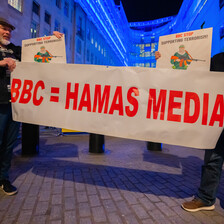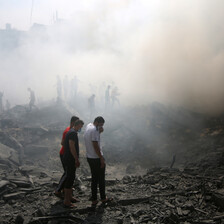The Electronic Intifada 25 July 2025

A protester outside BBC headquarters on 11 May 2025.
AvalonA “dagger to the heart of the BBC claim to be impartial and to be trustworthy.”
That was what Samir Shah, the BBC chair, told a British parliamentary committee on 4 March, describing the documentary Gaza: How to Survive a War Zone.
But he wasn’t talking about its cancellation by the once venerable media institution.
Shah made his negative judgment of the film before he asked the BBC’s Peter Johnston to report on whether it was or was not in breach of BBC guidelines. This report duly found against the film five months later, solely on the grounds that the 13-year-old narrator’s father was an official in Gaza’s Hamas government.
The real dagger here was Shah’s hasty and cowardly assertion. Through him, the BBC was prostrating itself before some of its worst enemies and most savage critics, in government and in opposition.
Indeed, the contortions of excuse and prevarication BBC management has put itself through in the past half year to suppress this film have twisted the dagger further into the BBC’s corporate body. It has shown the corporation to be a patsy of the Israel lobby and Israel’s friends and influencers.
And it didn’t stop there. The BBC also managed to suppress another Gaza documentary, Gaza: Doctors Under Attack, that was commissioned by the corporation.
This has meant that the BBC has muffed two opportunities to show evocative, terrifying narratives from the Gaza Strip itself, where international journalists are banned by Israel.
These two films might partly have made up for the BBC’s wholly inadequate news reporting of Israel’s self-confessed attempt at clearing Gaza of its inhabitants and the genocide taking place there.
Fear has overwhelmed journalism.
Process not content
As a long-gestating BBC internal report has now reported, nothing in How to Survive a War Zone was found to be biased or partial. The breach of BBC editorial guidelines lay only in its failure to establish that its narrator, Abdullah al-Yazouri, is the son of a deputy agriculture minister, Ayman al-Yazouri.
This is a technocratic post in the Hamas government of Gaza, a government that was established after Hamas won legislative elections of 2006 but whose victory was denied by the West, Israel and the Palestinian Authority.
The conclusion: it is all about process, not about content.
The BBC could easily have kept showing the film rather than dropping it so hastily, just a few days after first showing, apparently forever. It should have dealt separately with the question of the narrator’s identity.
Anyone who has seen the film will know that there is no hint of Hamas control or pro-Hamas bias in the documentary. If anything, it’s the opposite.
The fault lies in the BBC’s own lack of rigor in questioning the independent makers of the movie, Hoyo. It could have explained this oversight and admitted responsibility.
However, no one at the BBC, including the head of news herself, CEO Deborah Turness, put their hands up to this lapse of journalistic practice. This allowed Zionists and their supporters, the government and a mainstream media always seeking BBC blood to bury the documentary in irrelevant contumely.
I have used the word cowardly about the BBC advisedly. In most of the corporation’s day-to-day news output on Israel-Palestine, and now with the burying of the two Gaza documentaries, the BBC shows itself to be more concerned – most concerned – with the reactions to its output from pro-Israel critics such as the self-styled Middle East media watchdog CAMERA, or UK Lawyers for Israel, rather than the material itself.
Reporting fully and accurately on the campaign of genocide and ethnic cleansing in all Palestine is not uppermost in the BBC managerial mind.
The Gaza doctors’ documentary “risked creating a perception of partiality,” said the BBC. As if in the current climate of pro-Israel clamor in Britain’s ruling circles, anything the BBC might truthfully report – and thereby defy or deny Israel’s positions – could do anything else for most of the British mainstream commentariat.
Set up
The BBC’s allegations that the reporter on the film, Ramita Nivai, had been a decisive factor in dropping the film was a shameful ruse. Her remarks in an interview on the flagship morning news show, the Today program, on 19 June, in which she is said to have described Israel as a “rogue state” were in a different context.
Nivai was not interviewed about Gaza per se.
The presenter, Amol Rajan, asked Nivai, who is of Iranian origin, what she had managed to hear from family and friends inside Iran during the Israeli air strikes in mid June.
What Nivai actually said was that Iranian fears about the Israeli attacks on Iran had been intensified by their hearing and knowing that Israel was a rogue state that was attacking civilians, primarily in the long campaign against Gaza, which naturally has been vividly and widely reported on Iranian and other media outlets.
I listened carefully to the exchange and it was certainly not at all clear that Nivai herself was accusing Israel of being a rogue state. Even if she had been, as a concerned person of Iranian extraction with family in great danger, it would hardly have been unusual.
It certainly was no adequate reason for the BBC to question her journalistic credentials to report on the beleaguered medics of Gaza. Nivai did not, as the BBC reported, appear on the Today program “discussing the war on Gaza.”
In other words, Nivai was set up.
In fact, the timeline of events makes clear that the BBC had decided long before the Today episode in question, in late April, that it was dropping the Gaza doctors documentary and was now, in desperation, casting around for ex post facto causes.
The film, eventually shown by the UK’s Channel 4 on 2 July, was definitively a searing and accurate report on the hell experienced by Gaza’s medical teams and their patients. If the BBC had wished to add more Israeli comments or denials than the ample number already in the program, it could have found ways to do so.
However, as the BBC so often points out when complaints are made by people opposed to or critical of Israel, internal balance is not always to be found within a program or item, but over time.
As a report by the Centre for Media Monitoring found, in a public meeting in the UK Houses of Parliament on 17 June, most BBC news coverage of Israel/Palestine is inadequate and favors the Israel narrative.
There is hardly ever any mention of ethnic cleansing despite openly stated Israeli plans to empty Gaza, nor of genocide, despite the British government’s role and a case before the International Court of Justice. These words are generally banned, even in the mouths of outside commentators – an intrusive bid to censor eyewitnesses and experts on the region by studio-bound editors, presenters and producers.
The BBC has almost entirely failed to recount the outsized number of deaths and assassinations of journalists, over 230 by now, in Gaza. It has generally failed to report or investigate the collaboration between the British airforce and the Israeli military, both in the use of the Royal Air Force base at Akrotiri in Cyprus for ferrying arms and other supplies to Israel and in co-operating in intelligence-gathering flights over Gaza.
Rot from the top
It has never mentioned the so-called Hannibal Directive, under the auspices of which the Israeli army and air force killed their own people, soldiers, security guards, captives and family members in the fields, towns and kibbutzim near Gaza on 7 October 2023, in an attempt to keep as low as possible the numbers of Israelis that Hamas and other groups could take back to Gaza.
This aspect of the 7 October casualty toll and the nature of that day’s killings is vital in trying to tell the real story of what happened that day.
But, as the stunned visage of the unfortunate BBC executive who appeared in the parliamentary reckoning when the Centre for Media Monitoring presented their report showed, proper answers and impartial reporting are not the concern of the BBC.
As I and so many others have reported here on The Electronic Intifada and elsewhere for nearly 25 years now, the BBC’s main concern in its handling of the news from Israel-Palestine is its own survival in the face of an increasingly vociferous regiment of Israel’s backers and apologists.
British Prime Minister Keir Starmer’s Labour Party is now doing everything in its power to tip the legal system and police forces against the majority in civil society who support the struggle for justice in Palestine and real solid sanctions against Israel, including the proper pursuit of war crimes charges.
The BBC is helping Starmer, not least in its lack of coverage, of the vast and continual protests against Israel’s genocidal wars by large swathes of British civil society.
The BBC does sometimes report well. There are shards of light in the darkness of trimming and evasion. On Monday 14 July, the Today program carried a first-class, uninhibited interview with Sam Rose, the acting director of UNRWA affairs for Gaza, followed by a commentary by the veteran former BBC Middle East Editor, Jeremy Bowen.
Proper coverage can be done and sometimes is, but it is sporadic, especially on the major news outlets to which politicians and Israel lobby pay most attention.
Responsibility for this farrago lies with top management, the news bosses and news managers who police what their reporters and correspondents can say and which voices the producers can call into the studios. This extends to the questions and strictures on what presenters can ask and what disciplines they must apply.
As the pathetic dithering over the two recent Gaza documentaries shows, these managers, from the director-general, the chair and the head of news on down to the overburdened and second-guessed journalists who put out the programs, regard themselves as primarily answerable to the British government and its continued support and sustenance of Israel. They are not concerned with truth, still less any public right to truth.
What the tragedy of the two documentaries has shown is that the BBC and its managers are more concerned with the BBC’s and their own survival than with the task the BBC’s Royal Charter – its constitutional basis – sets it. The government holds the purse strings of the BBC, so the government is in effect blackmailing the corporation on behalf of Israel.
Tim Llewellyn is a former BBC Middle East Correspondent and editor of the Britain Palestine Project website.



